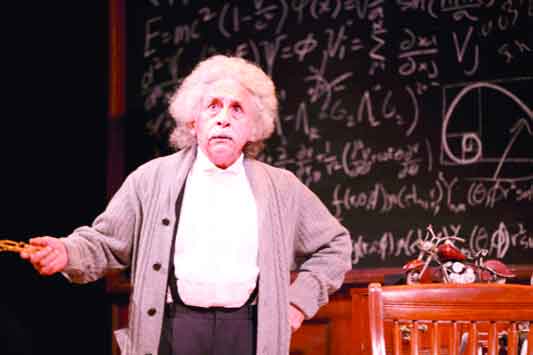When the pinnacle of arts meets that of science, one has Naseeruddin Shah playing Einstein in the eponymous play.
E= MC2. Theory of relativity. “When you sit with a nice girl for two hours you think it’s only a minute but when you sit on a hot stove for a minute you think it’s two hours. That’s relativity.” For most of us, that is what our knowledge of Albert Einstein, the German physicist is limited to. Things that make him unfathomable, unapproachable and also distant.
But how many of us know that he was extremely forgetful (he misplaced his room keys on his wedding night), didn’t wear socks because “all they did was to create holes,” had trouble maintaining relationships or was way behind the speaking curve when he was nine or 10 or loved to play the violin particularly Mozart. Things that made him human and identifiable with any of us. All this and more came to the fore during a play, Einstein, staged at the Delhi Theatre Festival by Motley.
Written, directed and acted by Naseeruddin Shah, who practically owns the stage from the word go, the play gives a better understanding of the man that was Einstein. The consummate actor that he is, there is no hint of Naseer slipping out during the entire course of 75 minutes of the play and we are drawn into the small world that the Noble Laureate inhabits.
The shock of white hair is unmistakable as is the way the scientist dressed. The accent, with German intonations, is bang on as it doesn’t slip even once during the entire run of the play. One realises that rather than the forbidding character, thanks to being the towering figure in physics that he was, Einstein was human. He could engage in self-deprecating humour, call a spade one without any qualms of what people would say and take a strong stand for things that he believed in.
He also makes you think. An avowed pacifist, he points out that the destruction that would be caused during the third World War would ensure that the next war would be fought with stones. One could not help but step back from the play and reflect on contemporary times where sabre-rattling in the neighbourhood and talk of a nuclear war which would have “consequences for the whole world,” has become everyday chatter. But then what is art, if not a reflection of life?
However, this was not the only reference to contemporary times that one could glean from the play. When talking about a Bishop’s apparent displeasure with him for stating that, scientists were the most religious of people as they were always studying the conformity in the Universe created by God. One priceless nugget which comes out of the interaction, “I was forgetting you cannot have a good religion unless you can lay your life down for it.” The resonance with a time where religion seems to have become the biggest reason why people disagree and kill each other is chilling. He is quick to argue that none of the scientists were ready to die for the Milky Way, so they couldn’t be called religious.
Moreover, in times where horse-trading and exchange of money for grabbing power have become commonplace, Einstein’s disdain for politics comes across as refreshing. His refusal to become the President of Israel as “It would come in the way of his work,” is something that politicians nowhere would look upto as a role model.
His contemporaries and their politics too are put under the microscope. Einstein talks about the conversion of Fritz Haber, a German Jew who was a chemist and considered the father of chemical warfare, to Christianity — which still did not allow him to be accepted in the Nazi fold completely.
The language is conversational, where Einstein is talking to the audience. He explains concepts like time, relativity, gravity and others simply by breaking them down to everyday incidents. At one stage, Einstein (I mean, Naseer, because he became the very embodiment of the physicist) called two people on the stage to explain a concept with the help of a sheet and two balls. When two men started walking towards the stage, he wanted that at least one should be of the opposite sex as “female empowerment is important.”
The set was simply designed and a perfect example of what we would have imagined the room of Einstein (or for that matter any scholarly person) to look like, crammed with books and minus any frills.
At one point, he pulls out a compass from the drawer which give us an insight into the mind of young Einstein and the way he got hooked to science, “I wondered why the needle pointed in only one direction.”
While watching the play, it was hard for the audience to remember that it was Naseer that we were watching and not Einstein. And that, is certainly the greatest compliment an actor can get. Only grouse, it could have been trimmed by just about 10 minutes to make it more engaging.


























